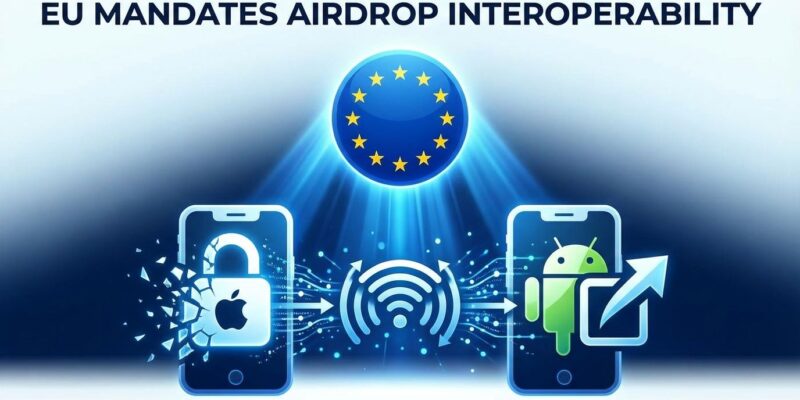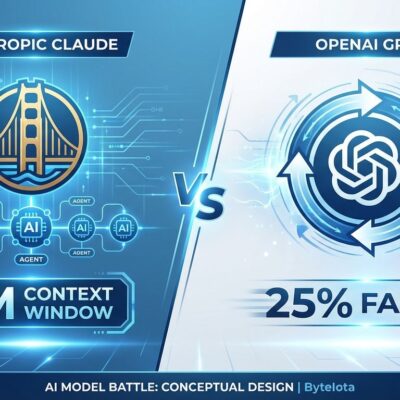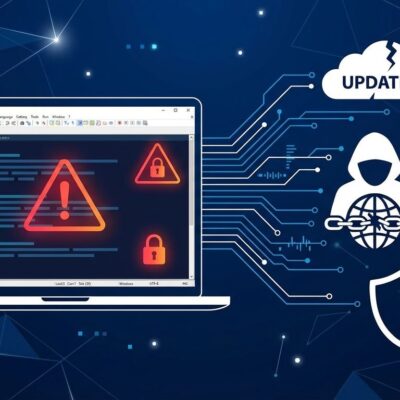
Google added AirDrop support to Android’s Quick Share on November 20, enabling cross-platform file sharing between iPhones and Android phones for the first time ever. The feature launched on Pixel 10 devices and works because the EU’s Digital Markets Act forced Apple to adopt Wi-Fi Aware protocol instead of proprietary AWDL. Google built this compatibility independently, without Apple’s cooperation, essentially reverse-engineering AirDrop to make it work with Quick Share.
EU Regulation Forced Apple’s Hand
This didn’t happen because Apple suddenly decided to play nice with Android. The European Commission’s Digital Markets Act mandated Apple adopt Wi-Fi Aware protocol instead of proprietary AWDL for interoperability compliance. Specifically, Apple must support Wi-Fi Aware 4.0 by iOS 19 (iOS 26) and Wi-Fi Aware 5.0 within nine months of publication. The company appealed these requirements in June 2025 and lost.
Apple would never have done this voluntarily. For years, the company built walls around file sharing, pairing, and connectivity features—forcing users into Apple-only ecosystems. Consequently, the EU just proved that regulatory pressure works. Moreover, this sets a precedent for future forced interoperability in messaging, payments, and app stores.
How Google Built AirDrop Android Compatibility
Google didn’t ask Apple for permission. Instead, the company reverse-engineered AirDrop compatibility based on the Wi-Fi Aware protocol that Android has supported since version 8.0 Oreo. Furthermore, the implementation uses Rust programming for security hardening, providing memory safety that prevents buffer overflow attacks. The connection is direct and peer-to-peer—data isn’t routed through servers and shared content is never logged.
NetSPI, a third-party penetration testing firm, conducted an independent security audit and found the Quick Share-AirDrop interoperability is “notably stronger” than other industry implementations with no information leakage. That’s a bolder claim than Google typically makes, and it’s backed by external verification.
What Works and What Doesn’t
The feature enables two-way file sharing between Pixel 10 and iPhone 12 or later. From Pixel to iPhone, it works if the iPhone owner sets AirDrop to “Everyone for 10 minutes” mode. From iPhone to Pixel, the Android device must be set as discoverable. Photos, videos, and files transfer directly over peer-to-peer connections.
However, limitations are significant. Only the Pixel 10 family is supported on Android currently, and macOS doesn’t support Wi-Fi Aware yet—making Mac-to-Android transfers impossible. Additionally, the setup isn’t automatic like native AirDrop. More importantly, requiring “Everyone for 10 minutes” mode on iPhone is a privacy trade-off. Native AirDrop’s contacts-only mode is more secure.
These are version 1.0 limitations. As Qualcomm expands support and Apple implements deeper integration by mid-2026, expect improvements.
Millions More Android Devices Coming Soon
Qualcomm confirmed on November 23 it’s bringing Quick Share-AirDrop support to Snapdragon-powered Android phones “in the near future.” That means Samsung Galaxy, Xiaomi, OnePlus, and Motorola devices will gain compatibility—millions of additional phones. Nevertheless, Qualcomm didn’t provide a specific timeline, but newer Snapdragon generations will get it first, followed by gradual expansion.
The feature may extend to tablets and laptops with Snapdragon chips. MediaTek’s Dimensity and Samsung’s Exynos platforms haven’t announced plans yet, but Quick Share is baked into Android, so other chipsets will likely follow. Within 6-12 months, most flagship Android phones will support cross-platform file sharing with iPhones.
First of Many Forced Interoperability Wins
This is a pattern, not a one-off. In fact, the EU Digital Markets Act is systematically dismantling Apple’s walled garden. Third-party smartwatch notifications are required in beta by the end of 2025. AirPods-style pairing for third-party devices must be available by the same deadline. Full Wi-Fi network sharing access is mandated by June 2026. Apple already implemented RCS messaging in iOS 18 and third-party app stores in the EU under DMA pressure.
Other regulators are watching. The US Department of Justice’s antitrust case against Apple cites similar interoperability concerns. The UK’s Competition and Markets Authority is investigating Apple’s App Store practices. Japan recently passed legislation targeting Apple’s payment restrictions. The EU’s DMA is setting the template for forcing Big Tech to open up.
Walled gardens are anti-competitive, not innovative. Consumers benefit when platforms interoperate. Apple forced to enable AirDrop on Android is a win—period. More forced interoperability is coming, and that’s a good thing.












